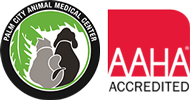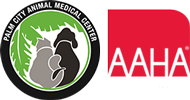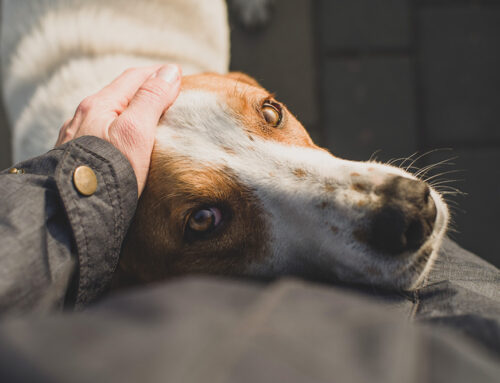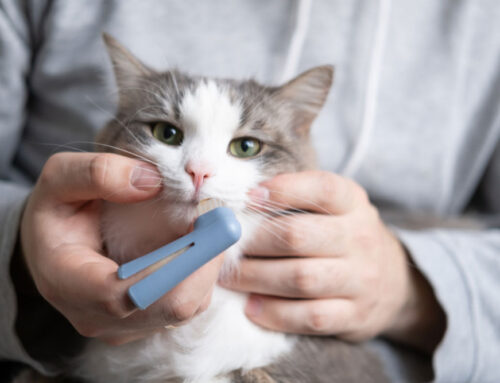It seems only yesterday we were preparing the grill and gathering with friends to ooh and aah about the July fireworks, but the fall and winter holiday seasons are rapidly approaching. Summer flies by quickly, but the last three months of the year seem to move faster, thanks in part to endless holiday to-do lists, parties, shopping, and, of course, holiday meals.
With all the holiday hubbub, sometimes our four-legged family members can get caught up in the chaos and get into trouble during the most wonderful time of the year. While the holidays may be magic, they don’t come with a magic wand—you can’t turn back the hands of time to prevent holiday pet mishaps, and nothing will ruin Christmas morning faster than rushing your pet to the emergency clinic. So, before the holiday whirlwind starts, review our list of holiday hazards.
Hazard #1: Food, glorious food
That most pet-related holiday mishaps are food-related is no surprise, since food plays a starring role in most holiday productions. With all the wonderful smells emanating from the kitchen and dining room, your four-legged helpers likely will be underfoot, not only at meal times.
Most pet owners admit to feeding their pets from the table, and we’d never think of asking you to be a Scrooge and deny your pets some turkey. It’s not the intentional feeding of holiday treats that can prove dangerous to pets. Those extra calories aren’t good for them—or us—but the real danger lies in the unintentional feeding, meaning the unattended plates, party platters, piles of dishes, and spilled alcoholic drinks in tongues’ reach. When your pet scarfs down food and drink meant for people, it can spell disaster. We see a lot of pets for vomiting and diarrhea right after each holiday due to eating food their system is not used to.
- High-fat foods — Ingestion of fatty, rich foods can have major gastrointestinal consequences for pets, most commonly diarrhea and vomiting, but also the more serious issue of pancreatitis, which may require hospitalization and can be life-threatening.
- Chocolate, and more — Some human foods are toxic to pets. You may know about chocolate, but did you know that the sugar substitute xylitol can cause hypoglycemia and liver failure in your dog? Other foods on the naughty list for pets include:
- Grapes and raisins
- Macadamia nuts
- Alcohol
- Yeast in raw bread dough
- Onion and garlic, especially in cats
- The pits — Dogs aren’t always discriminating in what, or how, they eat, and will often gobble up foods that won’t go through the digestive tract. For example, dogs will often eat stone fruits (e.g., peaches and plums), corn cobs, or avocados, swallowing them whole. While the flesh is easily digested, the pits remain, and depending on the size of your dog, the pits can lodge in her intestines and become an obstruction that likely will require surgery.
Hazard #2: Trees and ornaments
If your family celebrates Christmas, pay close attention to the Christmas tree. Some pets disregard the trees completely, while others climb them for a bird’s eye view, or use the lower ornaments for batting practice. Take care to:
- Secure your Christmas tree so it cannot be knocked over.
- Avoid putting glass ornaments in paws’ reach, because shattered glass can lead to foot lacerations that may require stitches.
- Forget tinsel and ribbon, which curious cats love to play with, but, if ingested, may cause linear foreign bodies, akin to the intestinal foreign body in the peach pit-eating dog.
- Avoid adding chemicals to the Christmas tree water, because pets enjoy drinking from the tree stand, and while pine-scented water isn’t a danger, the chemicals may be toxic to pets.

Hazard #3: The decking of the halls
Part of the holiday fun is decorating the house, but you must consider your decor from your pet’s viewpoint to avoid potential disaster.
- Electric cords — Extension cords and other electric wires are often used in abundance, but pets—especially puppies and kittens—will probably see them as fair game for play. A misguided chomp may land them in the hospital with oral burns, or worse, so use cord protectors to keep your little elves safe.
- Seasonal plants — Holiday plants are beautiful, but many are toxic to pets. You probably know about poinsettias, which are mildly toxic and mostly cause oral irritation, but did you know that holly and mistletoe can have more serious effects on pets? Both can cause gastrointestinal upset, and mistletoe ingestion can lead to low blood pressure, seizures, and potentially death.
If you’re traveling for the holidays, call or text us to ensure your pets are up-to-date on their vaccines. Whether they are boarding or traveling with you, you’ll want to keep them safe from infectious diseases. Also, call your pet’s microchip company to ensure your contact information is correct.
The holidays are meant to be spent with family members, whether two-legged or four, and we wish all of you a happy holiday season. Contact us with your questions or concerns, and add us to your holiday card list—we love hearing from our clients.








Leave A Comment